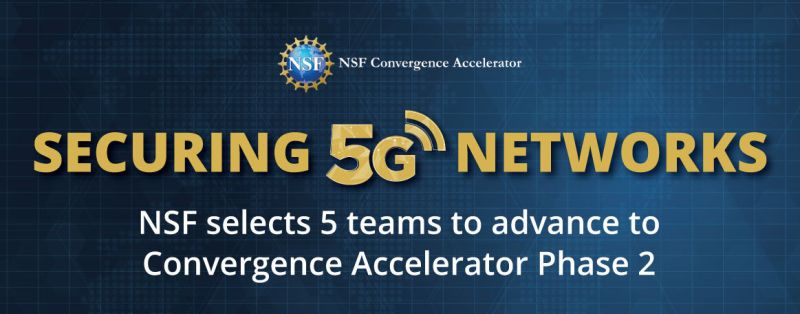Through a $25 million investment, the National Science Foundation’s Office of Technology, Innovation and Partnerships (TIP) is advancing five convergence teams from Phase 1 to Phase 2 of NSF Convergence Accelerator Track G: Secure Operations over 5G Infrastructure to address 5G communications infrastructure and operational challenges.
“NSF is pleased to foster greater synergy with the research and innovation community and end users in this important technology and mission area,” said Irwin Gianchandani, assistant director for TIP. “Working together, the teams we are investing in today will deliver tangible solutions and long-term outcomes for the U.S. military, federal government and critical infrastructure sectors that will utilize 5G networks.”
The goal of Convergence Accelerator Track G is to enable the enhancement of end devices such as smartphones and tablets and the expansion of 5G wireless infrastructure to enable military, government and critical infrastructure operators to operate over public 5G networks while meeting security and resiliency requirements. The Convergence Track will support the development of technologies to secure 5G and enable the safe use of non-secure networks.
In September 2022, NSF selected 16 teams for Phase 1 of Track G. At the end of Phase 1, five awardees were selected for Phase 2 after formal proposals and presentations. Over the next two years, Phase 2 teams will participate in an innovation and entrepreneurship curriculum that includes technology development, intellectual property, financial management and planning, sustainability planning, and communications and outreach.
“High-impact deliverables and solutions are the primary focus for the NSF Convergence Accelerator program and the teams we invest in,” said Douglas Morgan, director of the Convergence Accelerator. “When talking with teams interested in joining our program, we always ask what they can build and deliver to their customers or end users within three years. Over the next 24 months, these Phase 2 teams will develop prototypes, but they will also be asked to create sustainability plans to ensure their continued success beyond the NSF Convergence Accelerator program.”
The winners of the second phase are:
- Automatic Internet Data Path Verification (Workaround):Led by Johns Hopkins University, AVOID secures 5G communications by reconstructing communications paths to avoid adversary-controlled towers, networks and locations, making critical 5G communications invisible to even the most sophisticated adversaries.
- Securing traffic for hidden 5G operations (Ghost): The GHOST team, led by the University of Colorado Boulder, is proposing a solution to operate securely over untrusted 5G networks by protecting user devices, preventing analysis of patterns of life, disrupting traffic analysis, and injecting false information to confuse or mislead adversaries about an organization’s operations and intentions.
- An intelligent, integrated 5G network designed for global operations (indigo): Led by AT&T Corporation, the INDIGO project employs human-centric artificial intelligence, integrates multiple zero trust capabilities and leverages an Open Radio Access Network (O-RAN) architecture to ensure secure, resilient and high-quality 5G communications for warfighters and first responders.
- Security Enhanced Radio Access Network (SE-RAN): SE-RAN, led by SRI International, is developing a multi-layered sensor and enforcement platform to manage security services for O-RAN compliant 5G+ mobile infrastructure.
- Zero Trust X (ZTX): The ZTX team, led by the University of Kansas, is proposing Zero Trust Chain, an end-to-end software solution designed to securely share situational awareness over 5G networks for military operations.
About the NSF Convergence Accelerator
Launched in 2019, the NSF Convergence Accelerator (TIP program) builds on NSF’s investments in fundamental research and discovery to accelerate solutions that impact society and the economy. The program’s interdisciplinary teams use convergence research fundamentals and innovation processes to foster the sharing of innovative ideas and the development of sustainable solutions. For more information about the NSF Convergence Accelerator program, visit the Convergence Accelerator webpage.
About TIP
TIP will leverage the nation’s broad and diverse talent pool to accelerate critical and emerging technologies to address pressing social and economic challenges. The Office is comprised of three main focus areas: accelerating innovation and technology ecosystems, establishing transformation pathways, and collaborating across sectors to improve U.S. competitiveness, grow the U.S. economy, and hire and train a diverse workforce for the high-wage jobs of the future. For more information about TIP, visit the TIP webpage.



